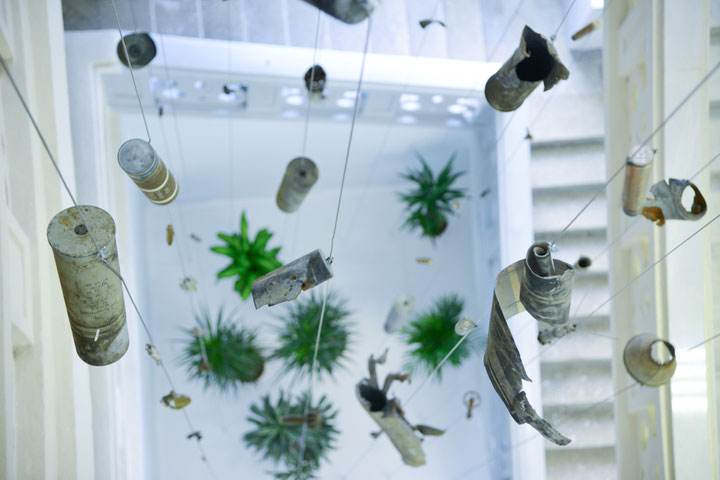Issue 4/2015 - Kiev, Moscow and Beyond
Unanswered Questions
An Interview with the Curators of the Kiev Biennale that Never Was
After receiving the invitation to propose a project for the Kyiv Biennial in March of this year, and having read the curatorial text, I felt that in order to give an answer and decide whether to take part or not, I would have to address some questions to the curators and to artists working in Ukraine. My attempt to organize a discussion with Russian and Ukrainian artists who had been invited was rather unsuccessful. No one from Ukraine, apart from Nikita Kadan, really participated in the exchange of e-mails. My invitation to the curators to make an interview, which could help to open up a discussion in the on-line press and in social networks floundered due to irresolvable organizational problems on their side. That is why, after waiting for more than a month, I decided to publish these questions with no answers, which might be even more telling.
Olga Jitlina: Dear Hedwig and dear Georg, first of all, I would like to thank you for the invitation to participate in the Kyiv Biennale. I admire your courage in undertaking such a challenging task as curating the Biennale in such a complex social and political situation. As an artist from Russia whom you invited to take part in it, I found myself in a tricky position. Reading all the versions of your curatorial concepts carefully triggered many questions. But when I undertook an attempt to discuss them with artists whom you had invited and whom I knew from Ukraine, only Nikita Kadan participated. My experience is that any criticism or questioning of Ukrainian politics that I express tends to be automatically interpreted as a pro-Kremlin position. In order to understand if I can find ways of engagement with the School of Kyiv, I would like to try once again to invite you, and hopefully a broader public, to discuss the upcoming Biennale. It may be important to stress that we all agree, I believe, in our implacable opposition to and denunciation of the Russian geopolitical and military aggression that began with the annexation of the Crimea peninsula in March 2014. Nevertheless, I find it necessary to question both European strategies and Ukrainian politics deployed in the country.
First of all, I wonder why “School?” How does the concept of enlightenment go along with the ongoing war situation?
Hedwig Saxenhuber, Georg Schöllhammer:
Jitlina: In a discussion on Facebook, initiated by Marija Tschechonadsich,1 Nikita Kadan proposes a highly poetic, yet also tragic, interpretation of the curatorial concept: “As far as the rhetoric of the Biennale is concerned, the subdued mood (enlightenment in wartime comes at the wrong moment and is impractical) is a more pronounced dimension than that of normalization (what can this Biennale normalize in society? It will be scarcely visible). That means, art will tend to torment itself rather than to heal anyone at all. But this is also more useful for art.“ Do you agree with this interpretation?
Saxenhuber, Schöllhammer:
Jitlina: As European, Austrian, curators, how can you describe your position and aims in this complicated geopolitical constellation?
Saxenhuber, Schöllhammer:
Jitlina: In inviting artists from Russia, what do you expect from them? Does the country of origin or residence make any difference for you?
Saxenhuber, Schöllhammer:
Jitlina: When reading your text, I stumbled over our usual contemporary art rhetoric, like "breaking borders”, “building bridges,” “a civil space of reflection,” “dialogue,” etc. I wonder what these idioms really mean at a moment when there is an urgent need for and impossibility of literal embodiment of some of them in the humanitarian and political senses.
How do you envision the realization of these metaphors? Between which groups do you hope to establish a dialogue? Who can be included and excluded from it?
Saxenhuber, Schöllhammer:
Jitlina: I had a feeling that the “Europeanizing” concept of the Biennale seemed to replicate, in a way, the geopolitical conflict. Do you think that in the given situation art could or should perhaps propose something completely different, its own maybe non-realistic strategy deriving from art’s own logic and nature? Or do you think it should, in this case, be subjugated to the political struggle?
Saxenhuber, Schöllhammer:
Jitlina: I would also like to ask you about The School of the Displaced. Describing it you write: “In Kyiv there are currently large numbers of people who have been displaced due to the conflict in the eastern part of the country. Along with social projects, NGOs and volunteer organizations, it is often artists and cultural institutions that help refugees to come to terms with and find solutions for the sociocultural problems that result from the psychological toll taken by the war and displacement.”
I wonder why you suggest inviting artists to deal first of all with the results of the ongoing war and not with its prime causes? Does it come from the feeling that it is impossible to influence the situation?
Saxenhuber, Schöllhammer:
Jitlina: Do you think there is a danger of censorship? How do you see a discussion of Ukraine’s history, present and future after the laws “on the condemnation of the communist and Nazi totalitarian regimes” and the threat of criminal sentences for denial of the “criminal character of the communist totalitarian regime of 1917–1991 in Ukraine”?2
Saxenhuber, Schöllhammer:
Translated by Helen Ferguson
1 http://www.facebook.com/maria.chehonadskih/posts/921764194512223?pnref=story
2 http://www.theguardian.com/world/2015/may/21/ukraine-bans-soviet-symbols-criminalises-sympathy-for-communism
